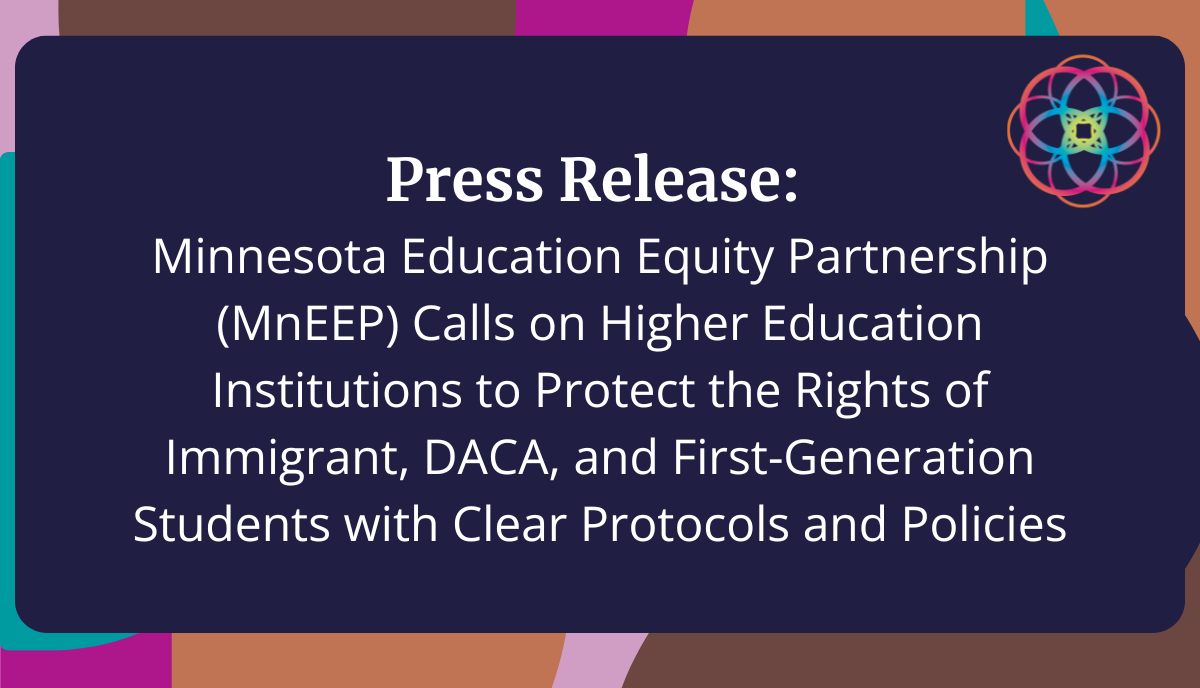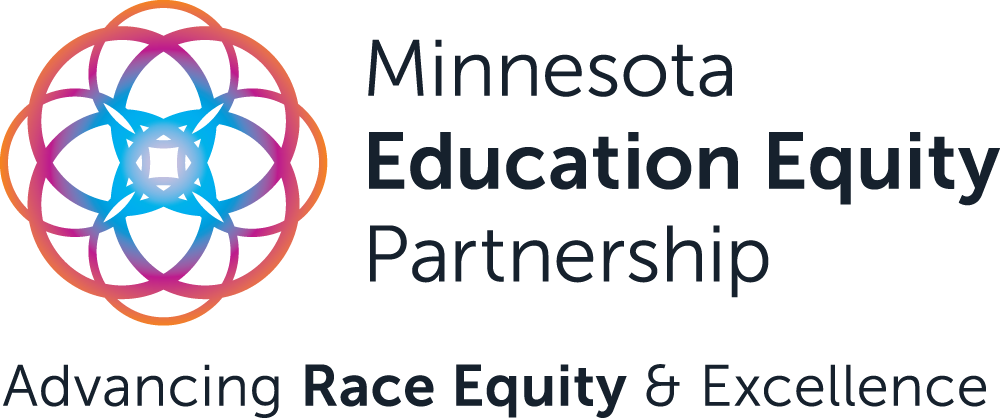
Minnesota Education Equity Partnership (MnEEP) Calls on Higher Education Institutions to Protect the Rights of Immigrant, DACA, and First-Generation Students with Clear Protocols and Policies
For Immediate Release
For media inquiries, contact Molly Priesmeyer, MnEEP Director of Communications
Minneapolis, Minnesota – February 1 – Minnesota Education Equity Partnership (MnEEP) is urging colleges and universities across Minnesota to adopt clear, actionable protocols to protect the rights, dignity, and aspirations of immigrant, Deferred Action for Childhood Arrivals (DACA), and first-generation students amid ICE enforcement threats.
“Every student has the right to feel safe and valued on campus, knowing their educational rights and human dignity are upheld, and their contributions are recognized,” said MnEEP Executive Director Carlos Mariani Rosa. “Ambiguity around ICE compliance policies creates unnecessary fear and discourages students from fully engaging in their education. By adopting clear, transparent protocols and robust support systems, Minnesota’s higher education institutions can remove barriers, foster belonging, and demonstrate their commitment to the dignity, safety, and success of all students.”
Why Clarification Is Urgent
Recent statements by the University of Minnesota regarding compliance with “federal warrants” have sparked concerns due to a lack of clarity in distinguishing between administrative ICE warrants and judicial warrants issued by a court. This ambiguity has caused fear and confusion among students, faculty, and staff, and the community, underscoring the need for comprehensive, transparent policies that prioritize student safety, belonging, and well-being.
Key Distinctions Between Warrant Types:
- ICE Administrative Warrants:
- Issued for civil immigration enforcement.
- Do not require judicial approval or oversight.
- Generally, they should not compel an institution to cooperate unless legally mandated.
- Judicial Warrants:
- Issued by a court and backed by judicial authority.
- Offer stronger legal protections for individuals.
- Require compliance under the law.
Without clear campus policies defining how and when institutions should respond to warrants, colleges and universities risk unnecessary cooperation with immigration enforcement, putting students at risk and eroding trust within the community.
For immigrant and DACA students, this uncertainty contributes to heightened stress and fear, which can harm their academic performance, mental health, and long-term success.
MnEEP’s Key Recommendations for Safe, Supportive Campuses
MnEEP calls on Minnesota’s colleges and universities to implement the following protocols to protect students’ rights, dignity, and ensure campuses remain safe spaces for learning:
1. Provide Immediate Clarification on “Federal Warrants”
- Clearly define the warrants that trigger compliance: Institutions must distinguish between judicial warrants (which are legally binding) and administrative ICE warrants (which should not compel cooperation unless legally mandated).
- Communicate policies widely: Share this information through campus newsletters, websites, and public statements to reduce confusion among students and staff.
2. Develop Comprehensive Protocols for ICE Encounters
- Step-by-step guidelines: Ensure staff and security personnel understand how to verify warrants, respond to ICE visits, and contact legal support when needed.
- Identify public and non-public areas of campus: ICE officers generally require permission or legal grounds to access non-public areas.
3. Provide Training for Faculty, Staff, and Campus Police
- Regular training sessions: Ensure personnel fully understand institutional policies, their legal responsibilities, and students’ rights through clear and ongoing training sessions.
- Policy communication guidelines: Provide staff with clear instructions and checklists to ensure consistent and accurate communication of protocols.
- Scripts and practical resources: Equip staff with tools to handle sensitive conversations and offer support to students experiencing stress or trauma.
- Scenario-based training: Conduct practical exercises to help staff apply policies effectively in real-life situations.
4. Conduct “Know Your Rights” Workshops for Students
- Collaborate with local advocacy organizations: Equip students with resources to protect themselves during ICE encounters and understand their legal rights.
- Distribute Know Your Rights materials: Make these resources accessible in multiple languages.
5. Strengthen Data Privacy and Protection of Student Records
- Ensure student records, including immigration status, are protected: Do not share this information with ICE without a judicial warrant.
- Implement internal review processes: Implement and monitor clear data protections and reject voluntary data-sharing requests from federal authorities.
Safety & Belonging Are Critical for Student Success
Immigrant, DACA, and first-generation students are essential to the long-term success of Minnesota’s higher education system and workforce. They are also key to advancing the state’s legislative goal of increasing the percentage of Minnesotans between the ages of 25 and 44 who have a postsecondary degree or certificate to 70% by this year.
Studies consistently show that students who feel supported and valued are more likely to persist and graduate, while those facing uncertainty or fear of deportation experience elevated stress and lower retention rates.
- Immigrant, DACA, and first-generation students make up 31% of higher education enrollment in Minnesota—more than 120,000 students—and play a crucial role in sustaining Minnesota’s higher education institutions and preparing the state’s future workforce.
- However, they face persistent barriers, including financial challenges, microaggressions, limited campus support, and systemic inequities. Only 40% of English Learner (EL) high school graduates in Minnesota enroll in higher education, compared to 58% of the general student population, according to recent Minnesota Statewide Longitudinal Education Data.
- Yet, immigrant-origin students have driven over 90% of domestic post-secondary enrollment growth in U.S. higher education from 2000 to 2022, highlighting their vital role in sustaining the success of our higher-ed institutions and preparing Minnesota’s future workforce.
“Now, more than ever, it’s critical our higher-ed institutions develop and implement clear, intentional policies that center access, safety and belonging for these students, fueling individual academic success and driving statewide progress, “ said Mariani Rosa.
Committing to Our Students Together
MnEEP’s Role in Supporting Model Policies
To address the critical barriers facing immigrant, DACA, and first-generation students, MnEEP partners with colleges and universities to inform, shape, and advocate for evidence-based model policies and practices that advance higher-ed access, equity, and success for Minnesota’s People of Color and Indigenous communities.
Through our networks, partnerships, trainings, and resources—including the MnEEP Higher Education Toolkit and the Safe & Supportive Schools for Immigrant and EL Students Toolkit—we provide institutions with the guidance needed to create safe, equitable campuses and foster a long-term sense of belonging. These model policies help improve retention, graduation rates, and overall student success, ensuring all students thrive.
By adopting these policies, Minnesota’s colleges and universities can build campuses rooted in safety, belonging, and success, where the strengths of immigrant, DACA, and first-generation students are honored, and their contributions to Minnesota’s economic, social, and cultural vibrancy are uplifted and fully realized.
“Minnesota’s higher education institutions are in a unique position to lead the nation in fostering inclusive campuses, where immigrant and DACA students can contribute to the state’s success and thrive academically, socially, and economically,” said Mariani Rosa. “We will continue to collaborate with institutions and communities to inform and support policies that honor and uplift the dignity, assets, and contributions of POCI students. Together, we can build a more equitable, just, and healthy Minnesota where everyone has the opportunity to thrive.”
######################
ABOUT MNEEP
Minnesota Education Equity Partnership (MnEEP) is a nonprofit membership organization committed to transforming systems, structures, and public narratives to advance race equity and excellence in education.
We envision a racially just society in which each student achieves their full potential.
Led by People of Color and Indigenous (POCI) thought leaders and experts, MnEEP uses a race equity lens to develop and advance networks, practices, research, and policies to build a more just, equitable Minnesota where every person has the opportunity to thrive.
Advancing Racial Equity in Higher Ed
MnEEP works through collaboration, research, and community engagement to ensure that policies reflect diverse perspectives, safeguard student rights, and promote equity and belonging.
We do this through:
- Facilitating meaningful collaboration across institutions and communities:
We bring together higher education leaders, faculty, staff, community organizations, legal advocates, and students to develop policies that reflect diverse student experiences and address their unique needs and aspirations. - Providing research-based recommendations and policy models:
MnEEP offers actionable, research-driven guidance to help institutions create clear, effective protocols that uphold students’ human dignity and rights while fostering inclusive and equitable learning environments that lead to their success. - Offering customized resources and training:
MnEEP works alongside institutions to deliver training on culturally validating best practices and provides practical tools and resources that remove barriers, foster student belonging, and increase retention and positive student outcomes.
Building deeper partnerships and sustained networks of support:
Through partnerships with communities, higher-ed institutions, policymakers, and POCI students, MnEEP ensures policies are continuously strengthened and adapted for meaningful, sustainable systems change and student success.
For more information or to connect with our training programs, networks, or support services, please contact us to explore how we can support your college or university in advancing higher-ed access and success for Minnesota’s POCI students.
